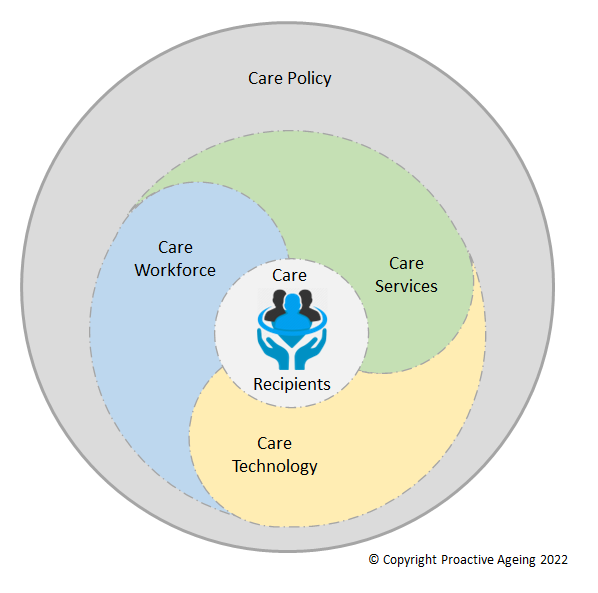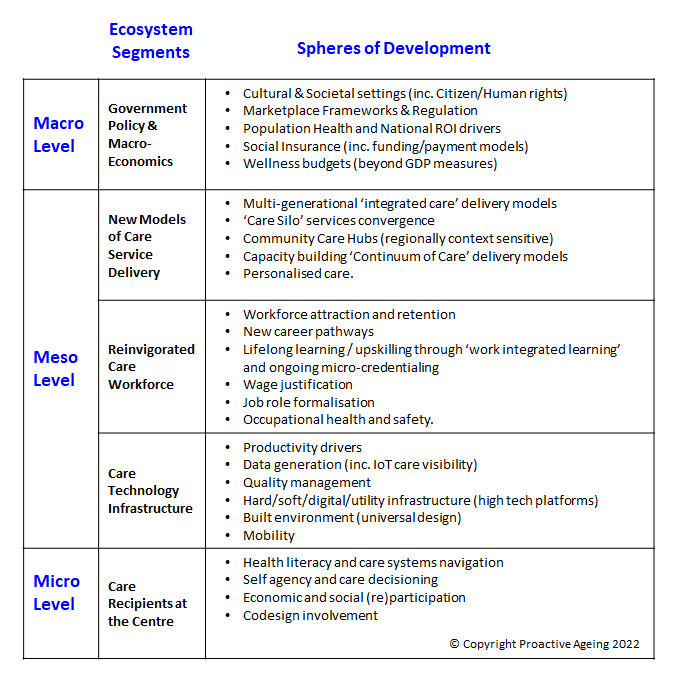The Care Economy
The Care Economy is an ecosystem comprising all the interrelated actors, activities and relationships involved in meeting the physical, emotional, social, and psychological aspects of societal care and support.
Care work encompasses a range of converging industry sectors such as chronic healthcare, ageing, disability, mental health, remedial education, and social work. It involves teachers, nurses, community healthcare, social and domestic workers.
Many ‘early adopter’ organisations in this industry sector are now setting new aspirational goals for relationship-based care and seeking out new multi-disciplinary collaborations to help them achieve this.
The care economy remains an integral but much undervalued element of economies all over the world, improving the welfare of communities, and better positioning them for more equitable social and economic development.
The Care Economy is an ecosystem comprising all the interrelated actors, activities and relationships involved in meeting the physical, emotional, social, and psychological aspects of societal care and support.
Care work encompasses a range of converging industry sectors such as chronic healthcare, ageing, disability, mental health, remedial education, and social work. It involves teachers, nurses, community healthcare, social and domestic workers.
Many ‘early adopter’ organisations in this industry sector are now setting new aspirational goals for relationship-based care and seeking out new multi-disciplinary collaborations to help them achieve this.
The care economy remains an integral but much undervalued element of economies all over the world, improving the welfare of communities, and better positioning them for more equitable social and economic development.

×![]()
Care Economy Programs of Work
The Care Economy is one of the fastest growing industry sectors in Australia. Currently employing more than 2.1 million people and expanding faster than 15% p.a (ref ABS). It is forecast to generate an exceptionally large number of new jobs. According to the World Economic Forum, 40% of all projected job opportunities globally will involve the Care Economy.
Yet we know very little about how the breadth of it is structured or how it is effectively managed. Most of the service provision remains as ‘cottage industries’, in crisis (ref Royal Commissions), and desperately in need of modernisation. We need to rethink how the whole ecosystem system works.
In support of this endeavour, Proactive Ageing provides a series of intersecting ‘Programs of Work’ (ref table below).
In doing so, we take a ‘Social Determinants of Health’ perspective and adopt a convergence strategy to help join-up its many fragmented silos. This will achieve greater ‘economies of scope’.
All care economy service providers have common values and goals including greater consumer rights, offering choice and control, and developing a much more highly skilled workforce. They all require a capacity building approach, productivity enhancements, and 'lifetime cost of care' innovation investments. This will allow their government funding budgets to become much more viable over time.
Working through these commonalities and modernising the sector as a whole, provides one of the great engine rooms for national innovation and job creation. The economic ‘spill over’ effects beyond the sector are enormous.
Correspondingly, achieving any form of substantive social equity is impossible without a strong care economy in place. As such, there is a strong case for a comprehensive policy intervention directly aligned to the Sustainability Development Goals (SDGs) in education, health, and decent work.
The Care Economy is one of the fastest growing industry sectors in Australia. Currently employing more than 2.1 million people and expanding faster than 15% p.a (ref ABS). It is forecast to generate an exceptionally large number of new jobs. According to the World Economic Forum, 40% of all projected job opportunities globally will involve the Care Economy.
Yet we know very little about how the breadth of it is structured or how it is effectively managed. Most of the service provision remains as ‘cottage industries’, in crisis (ref Royal Commissions), and desperately in need of modernisation. We need to rethink how the whole ecosystem system works.
In support of this endeavour, Proactive Ageing provides a series of intersecting ‘Programs of Work’ (ref table below).
In doing so, we take a ‘Social Determinants of Health’ perspective and adopt a convergence strategy to help join-up its many fragmented silos. This will achieve greater ‘economies of scope’.
All care economy service providers have common values and goals including greater consumer rights, offering choice and control, and developing a much more highly skilled workforce. They all require a capacity building approach, productivity enhancements, and 'lifetime cost of care' innovation investments. This will allow their government funding budgets to become much more viable over time.
Working through these commonalities and modernising the sector as a whole, provides one of the great engine rooms for national innovation and job creation. The economic ‘spill over’ effects beyond the sector are enormous.
Correspondingly, achieving any form of substantive social equity is impossible without a strong care economy in place. As such, there is a strong case for a comprehensive policy intervention directly aligned to the Sustainability Development Goals (SDGs) in education, health, and decent work.

×![]()